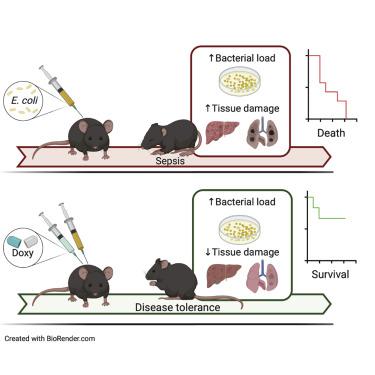Immunity ( IF 25.5 ) Pub Date : 2020-10-14 , DOI: 10.1016/j.immuni.2020.09.011 Henrique G Colaço 1 , André Barros 1 , Ana Neves-Costa 1 , Elsa Seixas 1 , Dora Pedroso 1 , Tiago Velho 1 , Katharina L Willmann 1 , Pedro Faisca 1 , Gerlinde Grabmann 2 , Hyon-Seung Yi 3 , Minho Shong 3 , Vladimir Benes 4 , Sebastian Weis 5 , Thomas Köcher 2 , Luís F Moita 6

|
Several classes of antibiotics have long been known to have beneficial effects that cannot be explained strictly on the basis of their capacity to control the infectious agent. Here, we report that tetracycline antibiotics, which target the mitoribosome, protected against sepsis without affecting the pathogen load. Mechanistically, we found that mitochondrial inhibition of protein synthesis perturbed the electron transport chain (ETC) decreasing tissue damage in the lung and increasing fatty acid oxidation and glucocorticoid sensitivity in the liver. Using a liver-specific partial and acute deletion of Crif1, a critical mitoribosomal component for protein synthesis, we found that mice were protected against sepsis, an observation that was phenocopied by the transient inhibition of complex I of the ETC by phenformin. Together, we demonstrate that mitoribosome-targeting antibiotics are beneficial beyond their antibacterial activity and that mitochondrial protein synthesis inhibition leading to ETC perturbation is a mechanism for the induction of disease tolerance.
中文翻译:

四环素抗生素诱导宿主依赖性疾病对感染的耐受性
长期以来,人们都知道有几类抗生素具有有益效果,但无法根据它们控制传染原的能力来严格解释。在这里,我们报告了靶向核糖体的四环素抗生素可以预防败血症而不影响病原体负荷。从机制上讲,我们发现线粒体抑制蛋白质合成扰乱了电子传递链 (ETC),从而减少了肺中的组织损伤并增加了肝脏中的脂肪酸氧化和糖皮质激素敏感性。使用肝脏特异性的Crif1部分和急性缺失是蛋白质合成的关键核糖体成分,我们发现小鼠受到保护免于败血症,这一观察结果通过苯乙双胍对 ETC 复合物 I 的瞬时抑制进行表型复制。总之,我们证明了靶向线粒体的抗生素除了其抗菌活性外还有益,并且导致 ETC 扰动的线粒体蛋白质合成抑制是诱导疾病耐受性的机制。










































 京公网安备 11010802027423号
京公网安备 11010802027423号